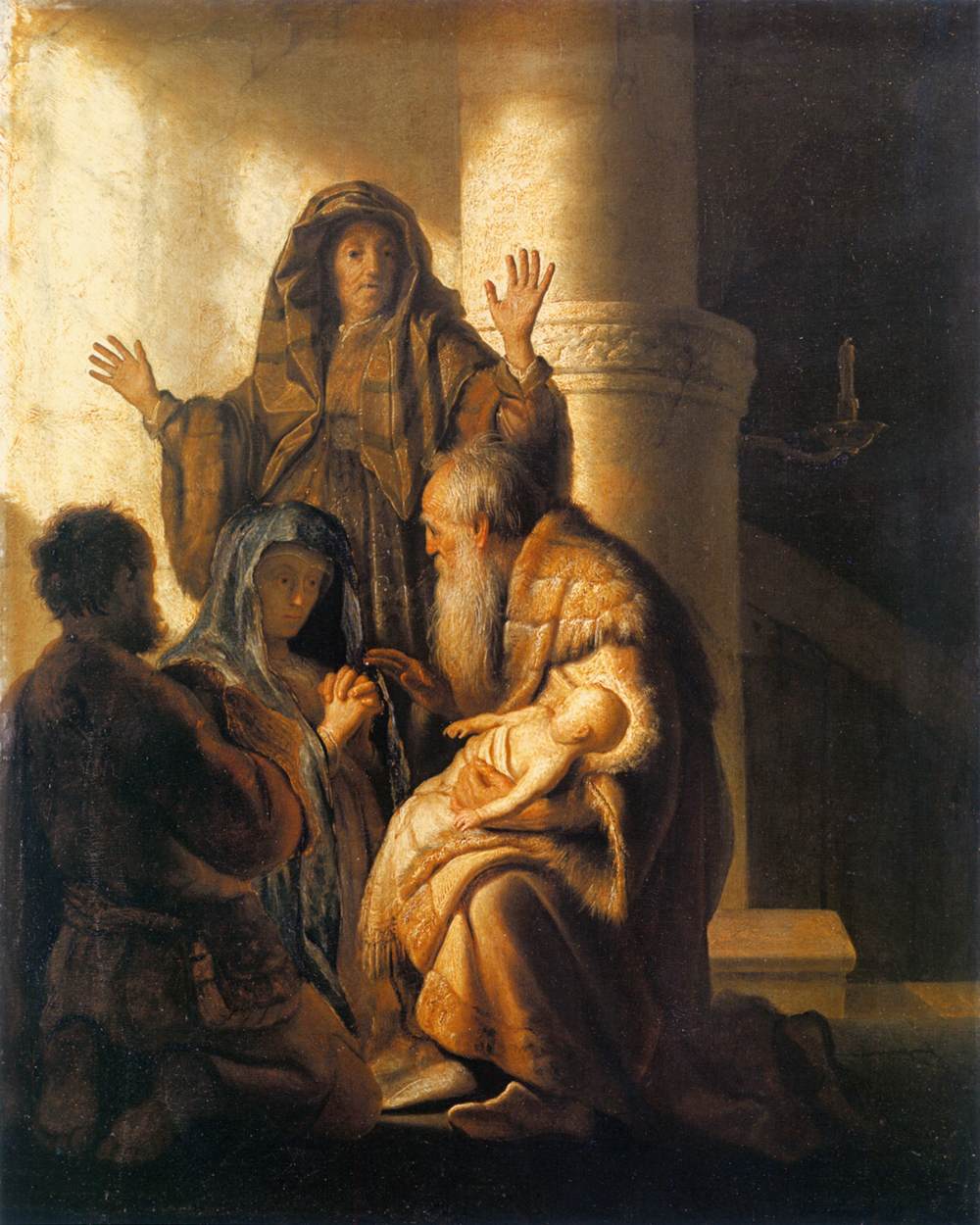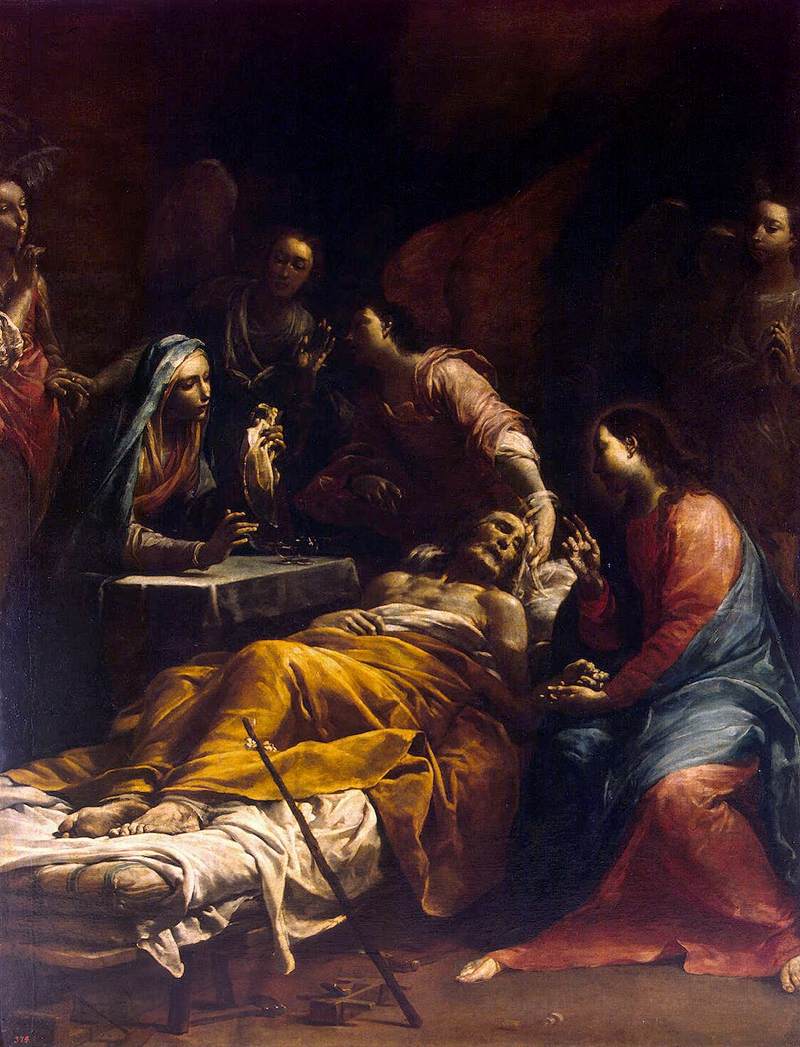The Dream of St Joseph, Rembrandt, 1650-55 [Web Gallery of Art]
Readings (Jerusalem Bible: Australia, England & Wales, India
[optional], Ireland, New Zealand, Pakistan, Scotland, South Africa)
Gospel
Matthew 2:13-15, 19-23 (New Revised Standard Version, Catholic Edition, Canada)
Now after the wise men had
left, an angel of the Lord appeared to Joseph in a dream and said, “Get up,
take the child and his mother, and flee to Egypt, and remain there until I tell
you; for Herod is about to search for the child, to destroy him.” Then Joseph got up, took
the child and his mother by night, and went to Egypt, and remained there until the death of Herod. This was to
fulfill what had been spoken by the Lord through the prophet, “Out of Egypt I
have called my son.”
When Herod died, an angel of
the Lord suddenly appeared in a dream to Joseph in Egypt and said, “Get up, take the child and his mother, and go to the land
of Israel, for those who were seeking the child’s life are dead.” Then Joseph got up, took the child and his mother, and went to the land of Israel. But when he heard that Archelaus was ruling over Judea in
place of his father Herod, he was afraid to go there. And after being warned in
a dream, he went away to the district of Galilee. There he made his home in a town called Nazareth, so that
what had been spoken through the prophets might be fulfilled, “He will be
called a Nazorean.”
Simeon and Anna Recognise the Lord in Jesus, Rembrandt, c.1627
My child, help your father in his old age,
and do not grieve him as long as he lives;
13 even if his mind fails, be patient with him;
because you have all your faculties do not despise him.
14 For kindness to a father will not be forgotten,
and will be credited to you against your sins;
15 in the day of your distress it will be remembered in your favor. (From today's First Reading, NRSVCE).
and do not grieve him as long as he lives;
13 even if his mind fails, be patient with him;
because you have all your faculties do not despise him.
14 For kindness to a father will not be forgotten,
and will be credited to you against your sins;
15 in the day of your distress it will be remembered in your favor. (From today's First Reading, NRSVCE).
It is significant that the First Reading in today's Mass on the Feast of the Holy Family reminds us of the old and how we should love them, especially our fathers. The most powerful image during the Christmas Season is that of the Infant Jesus and his helplessness, something that today's gospel emphasises. Without the protection of St Joseph, the Husband of his Mother, Jesus would have been killed.
But the First Reading reminds us of the helplessness of many old people, especially those with various forms of dementia. St Luke in his description of the presentation of Jesus in the Temple shows us an old man, Simeon, recognising and taking the Child Jesus in his arms and praising God, and Anna, a widow aged 84, also praising God and speaking about him. The lives of the very young and the old are intertwined, as this scene shows. But there is a special link when the old become, like the very young, dependent on others and sometimes need the kind of personal care they needed in their first year of life.
A friend of mine in England, Mrs Frances Molloy, founded the Pastoral Care Project, located in the Archdiocese of Birmingham, the purpose of which is stated below.
15
But the First Reading reminds us of the helplessness of many old people, especially those with various forms of dementia. St Luke in his description of the presentation of Jesus in the Temple shows us an old man, Simeon, recognising and taking the Child Jesus in his arms and praising God, and Anna, a widow aged 84, also praising God and speaking about him. The lives of the very young and the old are intertwined, as this scene shows. But there is a special link when the old become, like the very young, dependent on others and sometimes need the kind of personal care they needed in their first year of life.
A friend of mine in England, Mrs Frances Molloy, founded the Pastoral Care Project, located in the Archdiocese of Birmingham, the purpose of which is stated below.
Frances sent me this:
‘Like a weaned child on its mother’s breast.’ Ps 130.
In the course of my work with the Pastoral Care Project I have been privileged to meet many frail elderly people, many of whom are bearing the illness of dementia. Being with them deepens my awareness of how God reveals his love through them. When these experiences are reflected upon they become a moment of truth and a source of inspiration. I wish to share one such experience with you.
On one occasion, when I was preparing to lead a time of Adoration before the Blessed Sacrament in a Care Home, I noticed a resident as she was being accompanied to her seat by a member of staff, the lady seemed slightly agitated, and I noticed she was holding a bundle of clothes under her arm. It is not unusual in itself to see someone with dementia carrying personal items with them.
However, she seemed less agitated when my co-leader began playing the guitar and singing the first hymn. As I stood to read, I noticed the lady’s eyes were fixed on me. I had chosen a verse from the gospel of the day John 15:9. As I read, ‘As the Father has loved me so I have loved you,’ the lady repeated those words - her eyes still fixed on me; still holding the bundle of clothes under her arm. Sometimes a person with dementia will repeat what the person before them is saying.
The musician followed with the next hymn, the Hail Mary. During the hymn I looked around at the people present as they joined in the singing, but my eyes were drawn back to the lady with the bundle of clothes as she began to unfold them in harmony with the music. She was no longer agitated, she was careful in the way she was handling the clothes; reshaping them and then she then held them close to her, and began rocking as if comforting a child. The shape she had made out of the clothes actually looked like an infant wrapped in a blanket. What was once a bundle of clothes under her arm now resembled an infant being cradled. She sat contented and when the service was over she rose and walked away with confidence saying ‘thank you’ to me, with a wonderful smile – a stark contrast to when she first sat down.
The lady was clearly touched by the whole prayer experience. the co-leader and myself were quite overwhelmed at the time and reflected on it afterwards and in the days which followed. It is a reminder that affording people the time and space to engage with all the senses will help them to remember and participate in their faith. This is very important, even more so for anyone who is living with dementia and unable to ask to join in the community worship. For me this experience is something I cherish and each time I think about it I am still deeply touched, which is why I wish to share it with you. For me I often wonder about what was happening deep within her, was she holding her child, a grandchild or was it totally spiritual; did she feel she was being held by the loving, living God?
I would like to invite you to read and ponder the reflection; the Scripture, sing or pray the Hail Mary, and imagine the lady with dementia holding her bundle of clothes.
There are moments when people with dementia are transformed especially when they are singing or receiving Holy Communion. I hope by sharing this story it will be a source of encouragement for families and those who are apprehensive about pastoral visiting or taking Holy Communion to the sick
Please do write or email me if you have a story or reflection you would like to share. Sharing enables a better understanding of the person with dementia so that we may see God’s beauty in them.
Best wishes
Frances Molloy
Project Manager Pastoral Care Project, St Gerard’s, Coventry Road, Coleshill, B46 3ED, England, UK
Registered Charity 1094766
Sometimes adult children, and religious superiors, have to make very difficult decisions in order to take care of aged parents or members, decisions that aren't always accepted by the older person. But as the angel prompted St Joseph through a dream as to what he should do in order to take care of Mary and Jesus so will God prompt us when we are faced with the difficulties of caring for fragile older persons, some with dementia. The Holy Spirit prompts us in today's First Reading:
For kindness to a father (or to any old person in need) will not be forgotten,
and will be credited to you against your sins;15
in the day of your distress it will be remembered in your favor.
We may hope that in our final moments we will have the same companions as St Joseph had.
Céad Míle Fáilte romhat, a Íosa, a Íosa
A
Hundred Thousand Welcomes, Jesus
This Irish hymn is sung both as a Christmas carol and as a Communion hymn. The English translation below is not meant to be sung to the melody.
SA GHAEILGE / IN IRISH
Céad míle fáilte romhat, a Íosa, a Íosa,
Céad míle fáilte romhat, a Íosa,
Céad míle fáilte romhat, a Shlánaitheoir
Céad míle míle fáilte romhat, a Íosa, a Íosa.
Glóir agus moladh duit, a Íosa, a Íosa,
Glóir agus moladh duit, a Íosa,
Glóir agus moladh duit, a Shlánaitheoir,
Glóir, moladh agus buíochas duit, a Íosa, a Íosa.
Céad míle fáilte romhat, a Shlánaitheoir,
Céad míle míle fáilte romhat, a Íosa, a Íosa.
IN ENGLISH / SA BHÉARLA
A hundred thousand welcomes to you, o Jesus, o Jesus,
A hundred thousand welcomes to you, o Jesus,
A hundred thousand welcomes to you, o Saviour,
A hundred thousand welcomes to you, o Jesus, o Jesus.
Glory and praise to you, o Jesus, o Jesus,
Glory and praise to you, o Jesus,
Glory and praise to you, o Saviour,
Glory, praise and thanks to you, o Jesus, o Jesus.
A hundred thousand welcomes to you, o Saviour,
A hundred thousand welcomes to you, o Jesus, o Jesus.
Céad míle fáilte romhat, a Íosa, a Íosa,
Céad míle fáilte romhat, a Íosa,
Céad míle fáilte romhat, a Shlánaitheoir
Céad míle míle fáilte romhat, a Íosa, a Íosa.
Glóir agus moladh duit, a Íosa, a Íosa,
Glóir agus moladh duit, a Íosa,
Glóir agus moladh duit, a Shlánaitheoir,
Glóir, moladh agus buíochas duit, a Íosa, a Íosa.
Céad míle fáilte romhat, a Shlánaitheoir,
Céad míle míle fáilte romhat, a Íosa, a Íosa.
IN ENGLISH / SA BHÉARLA
A hundred thousand welcomes to you, o Jesus, o Jesus,
A hundred thousand welcomes to you, o Jesus,
A hundred thousand welcomes to you, o Saviour,
A hundred thousand welcomes to you, o Jesus, o Jesus.
Glory and praise to you, o Jesus, o Jesus,
Glory and praise to you, o Jesus,
Glory and praise to you, o Saviour,
Glory, praise and thanks to you, o Jesus, o Jesus.
A hundred thousand welcomes to you, o Saviour,
A hundred thousand welcomes to you, o Jesus, o Jesus.
The Holy Family, Francisco de Zurbarán, 1659 [Web Gallery of Art]





No comments:
Post a Comment